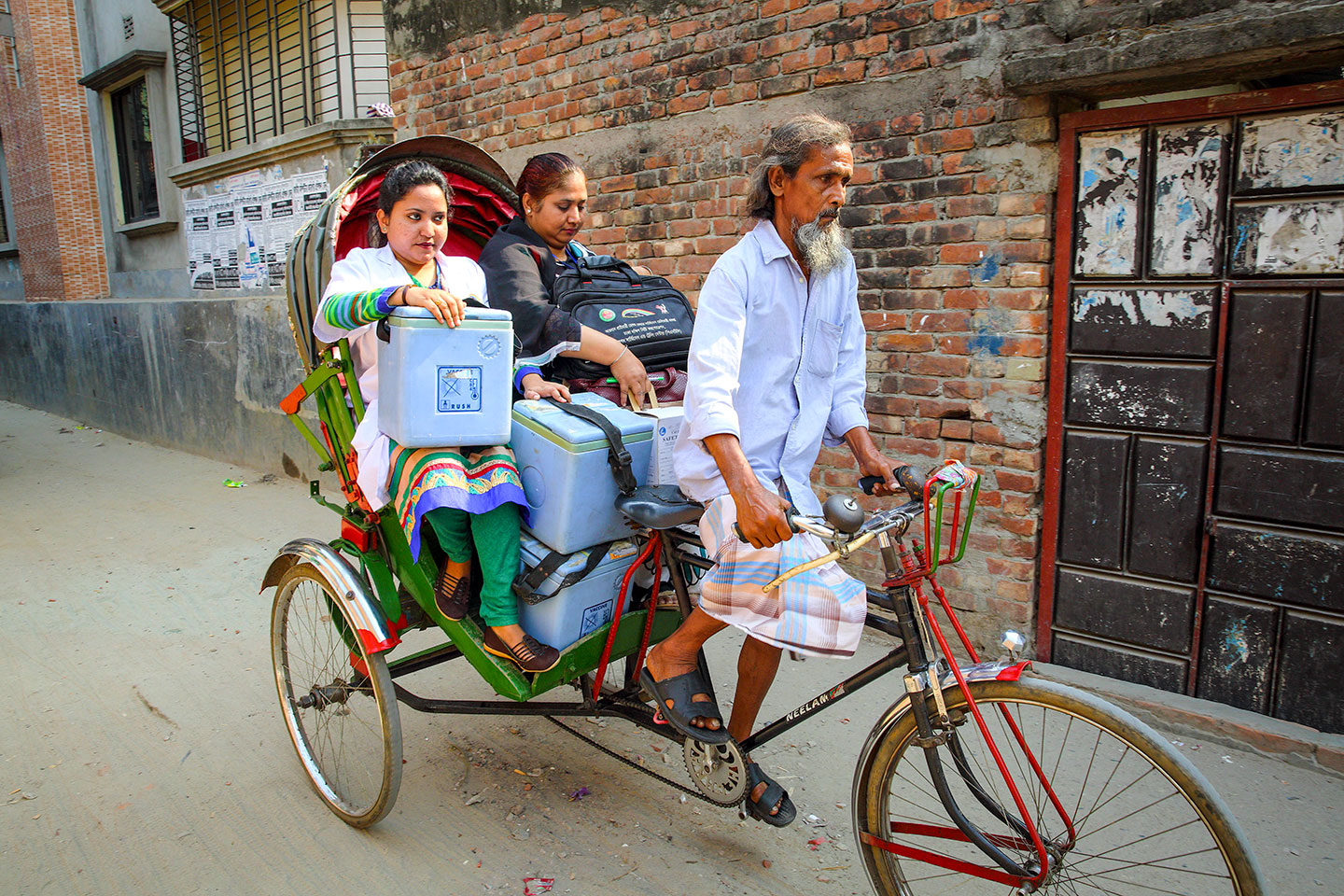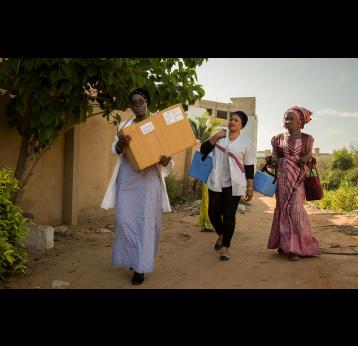Who and what is civil society?
Gavi defines civil society as the:
“Full range of formal and informal, non-governmental and not-for-profit organisations that represent the interests, expertise and values of communities. These are community-based organisations, civil society organisations, faith-based organisations, international and local non-governmental organisations, civil society networks, local professional associations, academia, not for profit advocacy organisations.”
The Value of Civil Society in Immunisation
There is no pathway to equitable immunisation without civil society organisations. Civil society partners hold the key to unlocking progress on Gavi’s strategic goals – their practical experience and holistic understanding of the communities where they work are essential ingredients to reaching ‘zero-dose’ and under-immunised children, missed communities and hard-to-reach areas.
- Remote communities and minority and marginalised groups often represent a sizable part of the last 15-20% of the population that miss out on life-saving vaccines. CSOs complement public sector delivery of immunisation services and extend services to hard-to-reach or vulnerable populations in areas where government programmes have limited access or effectiveness.
- The presence of CSOs at all levels of decision-making helps ensure that political and financial commitments are upheld, results are achieved, and that policies and programmes are inclusive and responsive to community needs.
- As CSOs have a strong footprint in communities they serve, they often understand vaccine reluctance at the most nuanced and localised level. Therefore, CSOs are often well positioned to generate demand for immunisation and to address misinformation and reluctance to vaccinate – including overcoming gender-related barriers.
- Many of the leaders, staff and volunteers that make up these organisations are also from the community, so their local knowledge and networks help ensure solutions are truly community-led and -owned.
Gavi’s CSO Engagement Strategy
Since Gavi’s inception, CSOs have been recognised as key partners for immunisation at global, regional and country levels. Although valuable CSO work has been undertaken with Gavi support, a 2018 evaluation identified a number of constraints with Gavi’s CSO support model. As per evaluation recommendations, Gavi carried out sector-wide consultations to co-create a new vision and approach for CSO engagement.
In December 2021, Gavi Board approved the new Civil Society and Community Engagement approach and introduced a new requirement for countries to allocate at least 10% of combined health systems strengthening (HSS), Equity Accelerator Fund (EAF) and Targeted Country Assistance (TCA) ceilings for CSO implementation, as they submit new funding requests to Gavi.
For Gavi 5.0 (2021–2025) ceilings by country and support type, click here.
In addition to core funding streams, Gavi has earmarked catalytic funding through COVID-19 vaccine Delivery Support (CDS) to strengthen the engagement of CSOs in COVID-19 vaccine delivery and routine immunisation integration.
Gavi’s CSO engagement is based on three strategic priorities and a cross-cutting set of strategic enablers to achieve them:
- political will and accountability: Building social and political will, advocating for immunisation commitments at the global, regional, national and sub-national levels, and holding decision makers and service providers accountable for equitable health service delivery.
- community demand: Building trust, confidence, and active demand for immunisation and primary health care, empowering communities, tackling misinformation and vaccine hesitancy, and overcoming social and gender related barriers to immunisation.
- complementing public service delivery: Complementing government, public sector immunisation service delivery and extending services to areas where government programmes have limited access or are not effectively utilised.
Strategic enablers: To deliver on these three objectives, Gavi works to support CSCE in national, subnational and Alliance health sector planning processes through capacity enhancement, funding and innovation.
Monitoring and data management
Gavi’s investments to CSOs are measured by two distinct but interrelated monitoring frameworks: one measuring Gavi Secretariat progress with regard to establishing an enabling environment for CSOs to deliver on Gavi 5.0 goals, and the other measuring contribution of CSOs in delivering on the Gavi 5.0 goals, in particular on reaching zero dose children and missed communities.
The following key performance indicators (KPIs) are used to monitor Secretariat performance in relation to CSO engagement:
- Board decision compliance: number and percentage of countries complying with Board decision on CSO ringfencing (10% of combined HSS, EAF, TCA funds allocation to CSOs) as they submit new funding requests to Gavi
- Allocations to CSOs: percentage and absolute allocation of funding to CSOs (disaggregated by country, funding stream, CSO category, and direct/indirect)
- Disbursements to CSOs: percentage and absolute disbursement of funding to CSOs (disaggregated by country, CSO category, funding stream and direct/indirect).
- Contracted CSOs: number of CSOs receiving Gavi funds (disaggregated by country, CSO category, funding stream, and direct/indirect).
Progress on delivering on Gavi’s new CSCE Approach
Gavi’s CSO team is focusing efforts on setting up internal Secretariat processes for CSO engagement and ensuring adherence to the Gavi Board decision on allocating 10% of combined HSS, EAF and TCA ceilings for CSO implementation.
As part of this work, the Secretariat is putting in place a streamlined and tailored grant process to enable effective and adapted direct engagement of CSOs and local partners.
To deliver on the Board mandate and to expand Gavi’s capacity to engage a larger and more diverse set of CSOs and local partners, Gavi has established an additional engagement mechanism which involves outsourcing grant support and procurement processes to Fund Managers. In 2023, the recruitment and onboarding of the two Fund Managers, MannionDaniels and Crown Agents, was concluded; and work is underway to implement their role in select countries.
How can CSOs engage?
There are three main funding pathways1 for CSOs to access Gavi funding:
- Full Portfolio Planning (FPP) processes
- Standalone Equity Accelerator Funding (EAF) and Targeted Country Assistance (TCA) applications
- Catalytic funding earmarked for CSO implementation
In addition to the core funding streams, Gavi leadership has set aside US$ 20 million for CSO engagement under the CSCE Strategic Initiative catalytic funding. As part of this funding envelope:
- Acasus has been contracted to provide technical assistance to the Government of Chad for strengthened engagement of civil society to support advancement of national immunisation objectives.
- CHAZ has been contracted to expand their operations in Zambia; and put in place a local capacity building initiative for CSOs in Lesotho and Zimbabwe.
- A new funding mechanism has been launched to strengthen CSO engagement and capacity building across Gavi’s HSS, EAF and TCA funding envelopes. This funding mechanism will support CSOs in more than ten countries, including: Côte d'Ivoire, Ethiopia, Mauritania, Pakistan and Sierra Leone.
In response to challenges for CSOs in accessing COVID-19 vaccine Delivery Support (CDS) funding available for COVID-19 vaccine delivery at country level, Gavi has allocated US$ 25 million for CSO engagement across all three CDS objectives (high-risk, adult population, routine immunisation/COVID-19 integration).
In Sudan, Gavi is collaborating with Save the Children and their network of local partners to complement government efforts on COVID-19 vaccine delivery in three low-coverage states.
Gavi encourages CSO participation starting from country dialogue through funding application submission. The Secretariat has recently introduced new pre-screening criteria for FPP and standalone applications to assess CSO engagement component, these are:
- Adherence to Board mandate: Does the allocation of funds to CSOs adhere to the Board mandate requiring that at least 10% of the combined requested HSS, EAF and TCA funds is allocated to CSOs? If not, has a robust rationale been provided as to why this is not appropriate in their context?
- Comparative advantage of CSOs: Are the roles and comparative advantages of CSOs in addressing current barriers to immunisation described, particularly in relation to reaching zero-dose and under-immunised children?
- Alignment between narrative proposal versus work plan and budget: Are the activities to be implemented by CSOs as indicated in the work plan and budget templates in line with what is described in the narrative proposal?
- Operational set-up: Are operational considerations related to CSO engagement described, e.g. coordination with government and other partners, CSO mapping done, types of CSOs to be engaged (local versus global), engagement mechanisms/selection approach, funds flow?
Read more about application process: Application Process Guidelines
For opportunities under catalytic funding: RFPs and consulting opportunities
CSO Steering Committee and Constituency
Civil society representatives formally created the Gavi CSO Constituency in 2010. The Gavi CSO Constituency is independent from Gavi and is not a legally registered entity. The CSO Constituency contains two major components: (1) CSO Steering Committee, and (2) CSO Constituency.
The CSO Steering Committee has been established to provide the perspective and voice of civil society at the global level and contribute to:
- strategic decision-making at the Gavi Board level;
- international, national and sub-national advocacy forums; and
- technical support to CSOs and CSO platforms for equitable and sustainable use of vaccines, the delivery of vaccinations, and improvement of health systems strengthening at all levels.
The CSO Steering Committee is an 18-member group of individuals who represent their respective CSOs.
The CSO Constituency has been created to engage CSOs from around the world as an important stakeholder to share voices of communities at the policy level, support advocacy, demand generation and service delivery in immunisation. Current Gavi CSO Constituency organisations range from large international and regional NGOs to local and national CSOs. The Constituency also includes a growing number of national pediatric associations and NGO consortiums as well as more technical and service-delivery oriented agencies.
Gavi CSO host: Following a competitive process, Amref Health Africa entered into an agreement with Gavi to provide strategic advisory services to the Gavi CSO Steering Committee and support capacity building efforts promoted by the Gavi Secretariat across the CSO Constituency for county-led engagement and implementation. As part of this agreement, which has been effective from 1 January 2022 for a period of three years ending in 2024, Amref also ensures coordination between the Gavi Secretariat, the Gavi CSO Steering Committee and the Constituency; and manages communications on key and relevant issues for the civil society immunisation community. Amref is the first organisation located in a lower middle-income country to host the CSO platform.
To learn more about the Gavi CSO constituency, or to become member, please visit the Gavi CSO Constituency website: https://gavi-csos.org/about-us/
- CSO engagement is an integral part of a wider programme, and implementation is not programmed or funded in isolation from other interventions and partners supported by Gavi.


